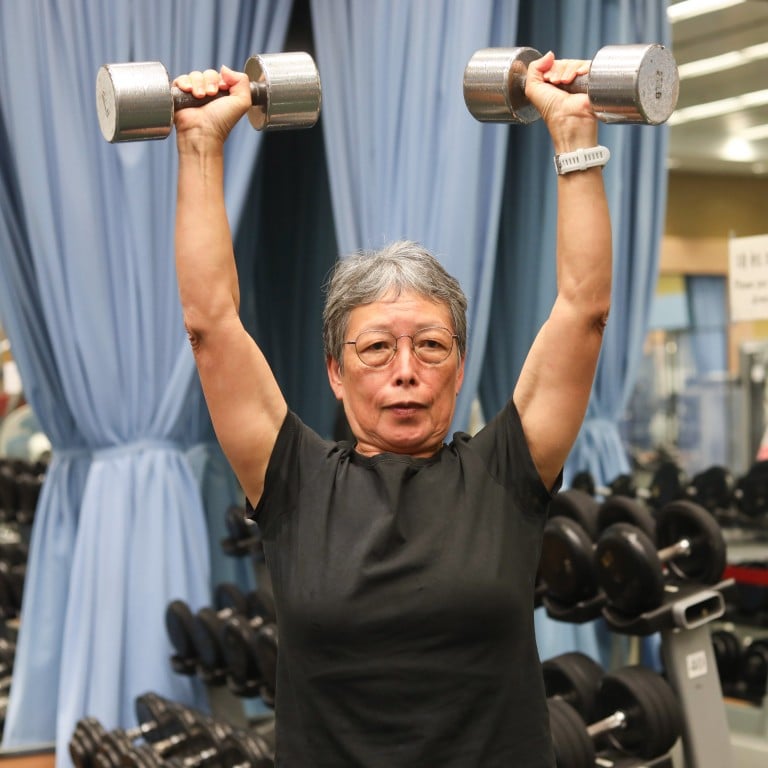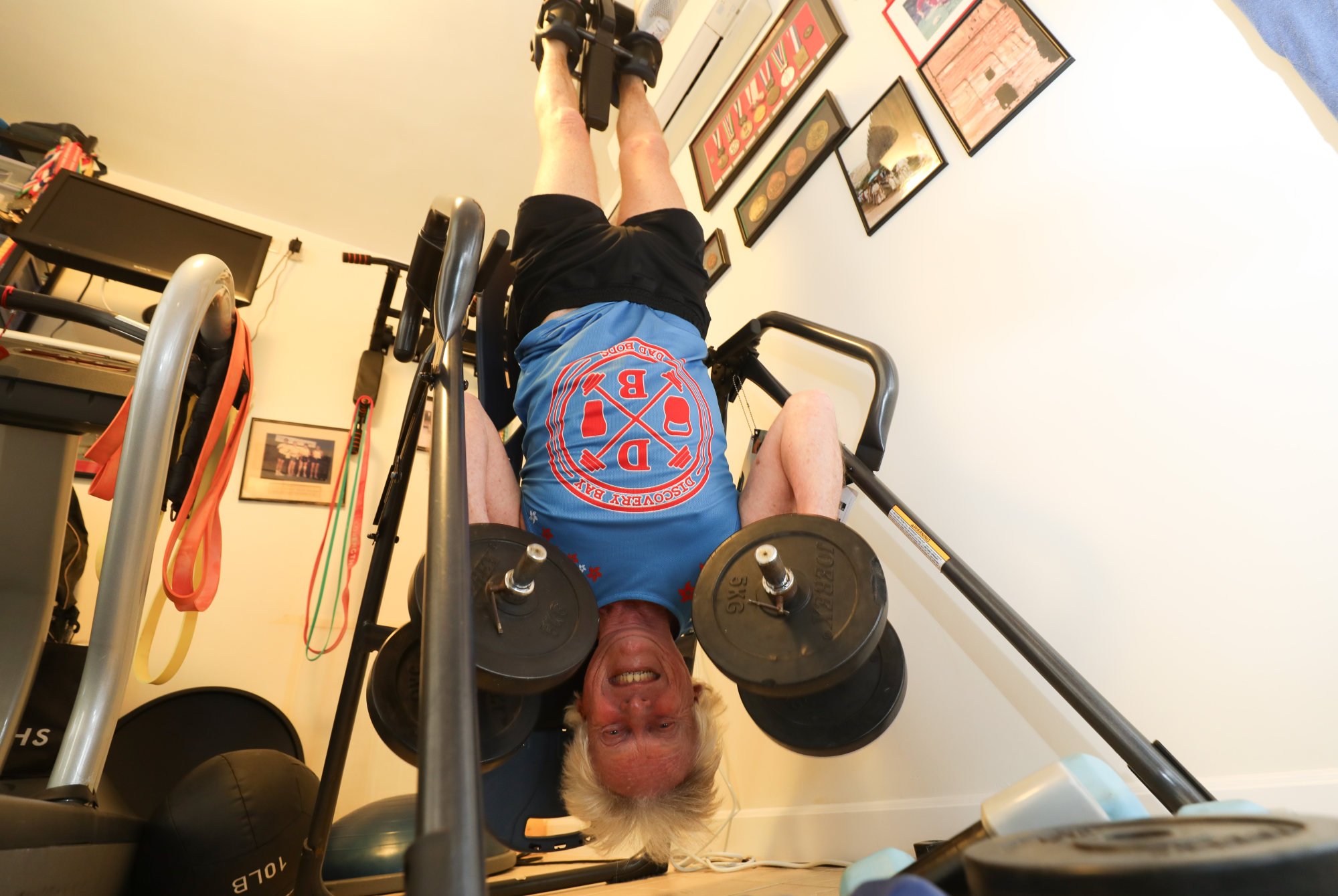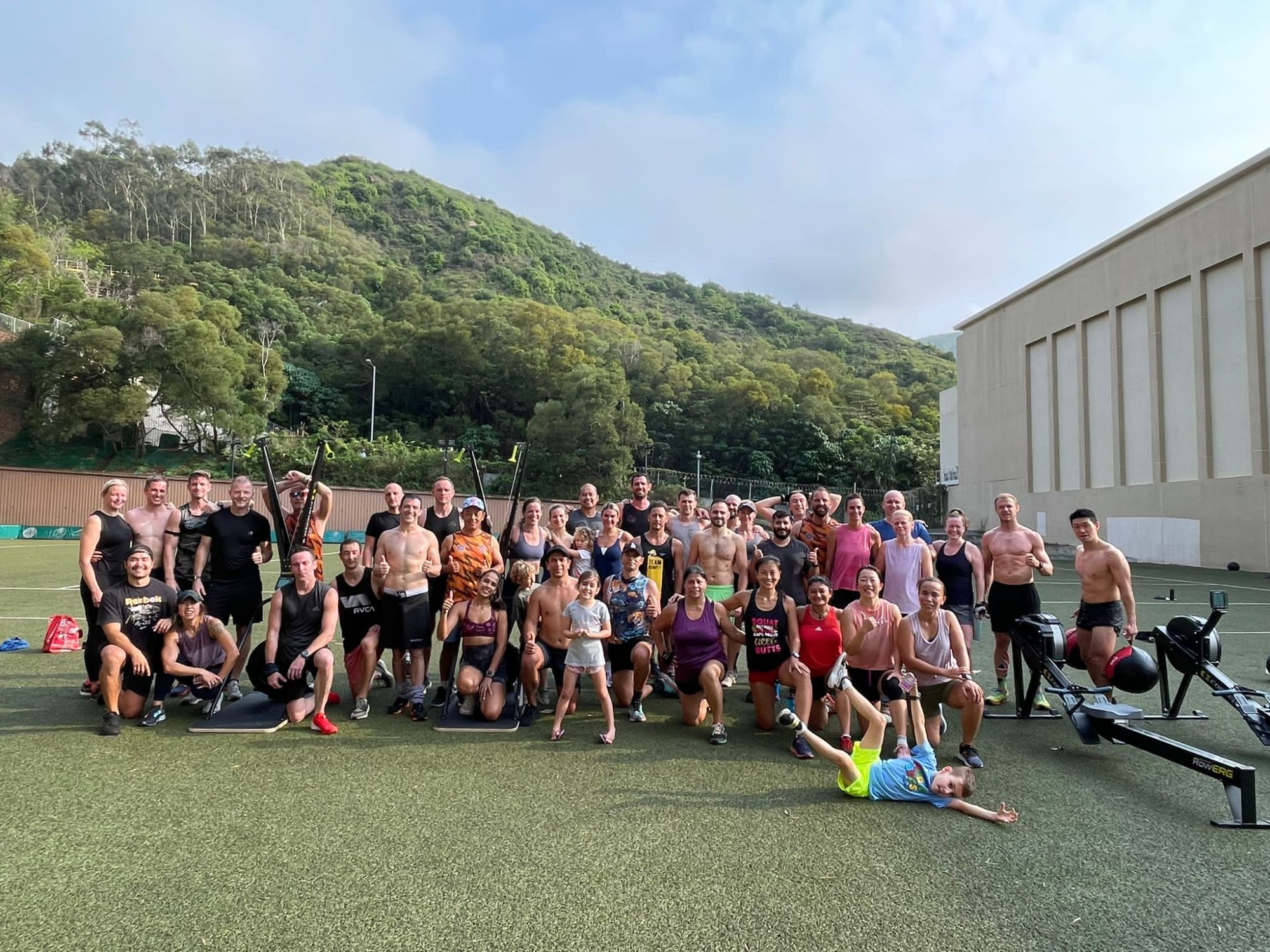
Staying fit with Hong Kong’s greying gym-goers: poster boys and girls Catherine and Geoffrey, both in their seventies, show age no obstacle
- Regular exercise can keep older people healthy longer, but they need role models, help to get started
- Many older people in community exercise programme became less frail, had less fatigue, walked better
Hongkonger Catherine Chow Pik-yuk rarely exercised when she was in her 20s. Bending over could land her in bed for days because of a spinal condition.
Today, the retired trading officer is one fit 70-year-old. She goes to a government-run gym in Tai Kok Tsui three times a week and runs three days a week.
Last year, she was the oldest woman in a fitness race, doing eight sets of gruelling gym workouts. They included eight 1km (0.6 miles) runs separated by challenges such as walking 200 metres (656 feet) holding two 16kg (35lbs) kettlebells, doing lunges with a 10kg sandbag and throwing a 4kg ball at the wall while squatting.
The mother of two grown-up sons took two hours, and won first place in the 65-69 age group.
“Many elderly people say their bodies are becoming useless. It may not be true. I can do things I could not do before, with the right training,” she said.

Chow’s transformation could inspire more elderly Hongkongers to exercise, get fit and slow down deterioration in their health as they age.
Greying Hong Kong has seen rising demand for elderly and healthcare services, with government recurrent spending shooting up from HK$71 billion (US$9.1 billion) in 2017-18 to an estimated HK$123.1 billion in 2023-24.
Demand is expected to keep growing, as the number of people aged 65 and above is projected to nearly double from 1.45 million in 2021 to 2.74 million in 2046, according to projections by the Census and Statistics Department.
Individuals such as Chow back research showing that regular exercise can help older people improve their fitness and overall health, enabling them to stay away from doctors and care homes.
One study found that more than half the elderly participants in a fitness programme saw their frailty levels improve after six months.
From hiking to fitness races
Chow’s journey to fitness began 10 years ago at a hiking trail in Tai Po near her home, where she combined walking with bend-over exercises.
“The first day, I climbed 300 steps and I bent over once,” she recalled. “On the second day, I bent over twice. In the end, I could bend over more than 200 times per day.”
The daily hikes led to Chow joining one of her sons and his friends at their badminton and running sessions.
Then, in 2022, her son told her about Hyrox, a fitness competition which originated in Germany and had spread globally, including to Hong Kong.
The race, which has various categories for people in different age groups and fitness levels, has been held three times in the city so far. It attracted more than 2,500 racers last November, competing individually and in teams.
She began working out for the competition’s routine of gruelling gym workouts and eight 1km runs.
Hong Kong cafe role-play helps to bring back memories for dementia sufferers
For her first Hyrox race in 2022, she paired up with her daughter-in-law in a relay and won the first runner-up prize in their category.
There were two races last year and both times, Chow, who was the oldest woman individual racer, finished in about two hours and topped the 65 to 69 age group.
“I was so happy that I could endure those tiring exercises. Never say no. Elderly people are not necessarily incapable of such things. It is only possible to succeed if you are willing to try,” she said.
Already looking forward to her next race in November, she said she was eager to see how she would improve.
“My goal is to maintain my current status and slow down the physical deterioration of my body,” she noted.
Keeping that ‘dad bod’ in tip-top shape
Solicitor advocate Geoffrey Booth has this to say about ageing: “Nobody likes it. But eventually, you realise that even if you don’t like it, it’s going to happen. It’s something you have to make the best of, isn’t it?”
He started rowing and circuit training 53 years ago while a student at Oxford University. Now 71 and the partner of a Hong Kong law firm, his passion for sports has not dimmed.

He was the oldest male participant in the Hyrox competition last year, joining a relay team with three of his gym buddies. When they completed the race in an hour and 46 minutes, Booth was declared the world record holder in the 70 to 74 age group.
The Briton said he moved to Hong Kong more than 40 years ago and found it a great place for rowing. His fitness routine included running and weight training.
As he aged, he realised that he was not as strong as before. While it helped to be flexible and adjust his gym and exercise workouts and set achievable goals, staying motivated to exercise was a challenge.
He keeps going by being part of a fitness group called DB Dad Bods in Discovery Bay, where he lives. He joins the mixed group of men and women of all ages three or four times a week for weight and resistance training.
“When you get older, you’ve got less steam. You’ve still got the engine, but it needs to get started. So as you get older, you need to be able to motivate yourself,” he said.
Hong Kong ageing faster than expected, sparking fears over healthcare in future
“That’s why the Dad Bods are great because one of the reasons all these people are drawn back morning after morning is they enjoy the company. Doing it together with a group is very stimulating.”
Like Chow, he said exercise and fitness would remain part of his life and he was also looking forward to his next Hyrox race.
Programme gets retirees to coach the elderly
Professor Terry Lum Yat-sang, of the department of social work and social administration at the University of Hong Kong (HKU), is a believer in encouraging the elderly to exercise regularly.
He started a programme in 2015 that trained more than 200 retirees to coach other older people in resistance and aerobic exercise. As of August last year, 1,596 men and women had been through the programme, trained by the coaches.
Out of 1,127 participants, half became less frail, about a third experienced less fatigue and under a third began walking more steadily.
An earlier HKU survey of 1,892 people aged 65 and above found that two in five were considered pre-frail and more than one in 10 were frail.

Lum said while many elderly exercised regularly, activities such as stretching or tai chi might not be enough. They also needed cardiovascular exercise such as walking, and strength training for healthy muscles.
But people might be discouraged if they found that fitness clubs were not elderly friendly, and there were limited places for exercise classes at government-run gyms.
He said the government should invest more resources to get older people to exercise and delay the onset of disability, which would save expenditure on healthcare and long-term care.
Having role models and interesting activities could also motivate more elderly people to start working out.
“It is best to find coaches who are also elderly so that they can relate to each other in terms of the physical challenges they face,” he added.
How extended reality can get older Hongkongers moving and battling real-life foes
Lobo Louie Hung-tak, associate head of Education University’s department of health and physical education, said strength and balance training could prove a lifesaver for the elderly.
“When people reach a certain age, they can develop sarcopenia where they lose muscles. It will increase their death risks because their metabolism can be affected, which will further impact their hormonal system and immune system,” he said.
“In Hong Kong, studies have shown that 10 per cent of the elderly can directly or indirectly die a month after getting hurt from a fall. As their physical activities drop, their overall health deteriorates rapidly,” he said.

